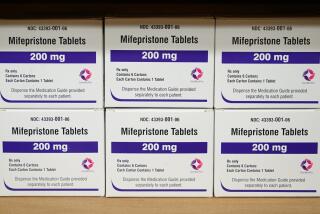Editorial: FDA should pull ineffective pregnancy drug Makena until we know it works

The U.S. Food and Drug Administration accelerated the approval of a drug called Makena meant to prevent premature births. Now there’s mounting evidence that the drug does not work. The FDA should use its authority to pull Makena from the market until and unless the company that makes it can prove that it is effective.
The drug’s approval was based on a flawed government-sponsored study: The test subjects weren’t in the same situations. Women who received the placebo were at higher risk than those who received the drug, so naturally their rates of preterm births were higher. Nor did the study look at whether use of the drug reduced infant death and disability — which is the main point of preventing preterm births.
Despite this questionable data and repeated concerns raised by one of its statisticians, the FDA approved the drug in 2011. But the agency, to its credit, called on the pharmaceutical company to conduct more research to show whether the drug prevented death or disability. The study, which took eight years to produce, found that it didn’t work, and in 2020, FDA staff recommended the medication be taken off the market.
It wasn’t. Makena is still being sold and administered to pregnant women.
The drug Makena doesn’t reduce the risk of preterm birth, a study found, and the FDA recommended it be taken off the market. Its maker has refused.
Clovis Pharma, the Luxembourg company that now owns the rights to the drug — ownership has changed several times over the years — points out that the second study, conducted internationally, included relatively few nonwhite women. That’s relevant because in the United States, Black women are 50% more likely to be at high risk of preterm labor than white women.
At best, the efficacy of Makena isn’t clear. It is generally considered safe, but common side effects include nausea, diarrhea, high blood pressure and migraines. At worst, however, it could be harmful. Some researchers have expressed concern about the possibility of long-term effects on babies whose mothers took it.
The FDA says that it sorted the data in the study to determine whether any racial group had better success rates with the drug and found it wasn’t working for any of them. The default for a medication whose effectiveness is in considerable doubt should be to remove it from the market. It’s unclear why the FDA, which approved the drug under a speedier process than usual, isn’t moving with similar alacrity to reverse itself now that it has determined the drug doesn’t work.
A Times report on the marketing of Makena found plans by previous makers of the drug to increase the number of expensive doses women took and to get them to stay on the medication even if they experienced uncomfortable side effects.
Clovis wants to conduct more research on Makena’s effectiveness. Good plan. But the drug should not remain on the market in the interim and should not be reapproved unless solid data show unequivocally that it works. The company has been granted an FDA hearing, but the hearing hasn’t even been scheduled. It’s been asked to stop selling the medication and refused, making the FDA’s prompt action imperative.
It is especially important not to keep an apparently ineffective drug on the market when it is disproportionately prescribed for Black women, who have suffered from discriminatory medical treatment throughout U.S. history. The Tuskegee syphilis experiment, racial bias in the prescribing of pain medication and similar experiences have led to an understandable lack of trust in mainstream medicine among many Black Americans.
The FDA also needs to take into account the public’s loss of faith in the accelerated-approval process if it doesn’t move swiftly to correct early errors. That process was meant to speed urgently needed treatments to those who would benefit, not to keep questionable medications on the market.
More to Read
A cure for the common opinion
Get thought-provoking perspectives with our weekly newsletter.
You may occasionally receive promotional content from the Los Angeles Times.











